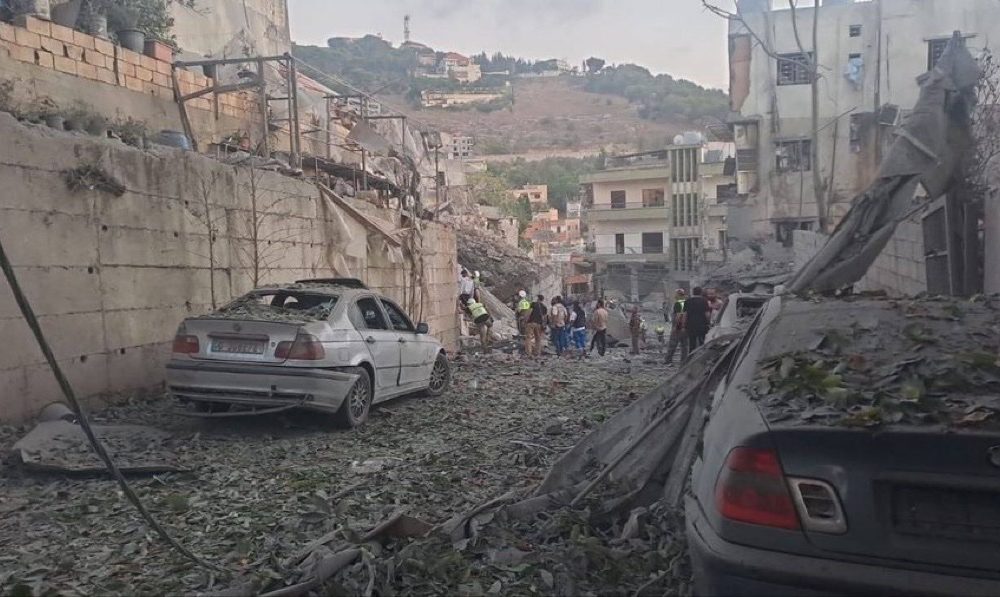Truce talks on Gaza and Lebanon, while the two-state solution is discussed in Riyadh
Hezbollah’s new chief does not rule out negotiations, but warns that it will take weeks or months. Caretaker Lebanese Prime Minister Mikati is optimistic, waiting for developments from Hochstein's mission to Israel. But opposition remains on both sides. Meanwhile, the Saudi capital hosts a two-day meeting of the “International Alliance to implement the Two-State Solution".
Beirut (AsiaNews) – From the Middle East, especially Beirut, come the first, albeit timid glimmers of hope for a truce that could put an end, even for a limited period, to the spiral of war and violence before lasting peace talks get underway. For now, we only have words, waiting for concrete developments.
In Gaza, Hamas leaders have rejected a proposal for a brief stop in the fighting, while in Saudi Arabia, which has remained on the sidelines of the region’s devastating wars, an international alliance in favour of the Palestinian state is holding its first meeting in the capital Riyadh.
This has provided an opportunity to condemn the "genocide" in Gaza, where more than 30 people died today, and reiterate, responding to the words of Israeli Prime Minister Benjamin Netanyahu, that ties with the Jewish State in the Abraham Accords are possible only after the two-state solution is implemented.
In Lebanon, Hezbollah’s new leader, Naim Qassem, who took over after the death of Hassan Nasrallah, said that he is willing to negotiate a ceasefire with Israel.
In an interview with the Lebanese newspaper Ad-Diyar, cited by Israel's Haaretz, the leader of the Shia movement, warned, however, that it could take weeks or months to get an agreement; despite greater diplomatic activity, changes on the ground are not expected any time soon.
Meanwhile, fighting continues and dead bodies pile up. An attack today by Hezbollah on the Israeli border community of Metula killed five people, including an Israeli farmer and four foreign workers.
According to some sources, Hezbollah could withdraw its troops and weapons north of the Litani River, establishing a buffer zone along the border with Israel, delinking its war from the one in Gaza.
The short-term goal is a three-day truce as part of a proposal to be presented in the coming days. For his part, US special envoy Amos Hochstein, during a meeting with Lebanon’s caretaker Prime Minister Najib Mikati, said that he sensed a change in Netanyahu's position. Tomorrow he travels to Israel.
Still, there is strong opposition to negotiations, or at least to concessions, on both sides. The speaker of the Lebanese Parliament, Nabih Berri, a Shia, said that any change to UN Resolution 1701, “even by one word” is “out of the question”.
Such words do not encourage optimism in someone like Moshe Davidovich, head of the Mateh Asher Regional Council, northern Israel, and president of the Confrontation Line forum.
When asked about the diplomatic talks he said: “I don't interfere with the IDF's military considerations, but at the political level – the real threat to our residents hasn't been removed! There's direct anti-tank missile fire on border communities, and it's still happening.”
In Lebanon, there is greater confidence in the Prime Minister's Office. Mikati himself said that he was hopeful about a possible truce with Israel. Speaking about talks with Hochstein, he said that a ceasefire could be achieved before the US presidential election next Tuesday.
"We are doing our best... to have a ceasefire within the next few hours or days," said Mikati, who remains "cautiously optimistic" about the prospects of a truce.
An initial ceasefire of 60 days is proposed, with the Lebanese army deployed along the border taking Hezbollah's weapons in the south. In exchange, Israel would pull its troops across the border within seven days, replaced by some 10,000 Lebanese troops.
At the end of this period, Israel and Lebanon would undertake indirect negotiations via the United States on the full implementation of Resolution 1701 settling all border disputes.
If signs of openness are coming from Israel’s northern front, war and violence continue in Gaza.
A senior Hamas official, Taher al-Nounou, told AFP that his organisation rejects any temporary truce. “We have already expressed our position on the idea of a temporary truce in the war, which will only serve to resume aggression afterwards,” he said.
In his view, the aim is for a "permanent, and not temporary, cessation of the war" in addition to the withdrawal of Israeli soldiers from the Palestinian enclave. Meanwhile, the death toll among Israeli soldiers is just shy of 400, with more added each day.
This undercuts any faint hope for a break in the war. Nevertheless, Egyptian President Abdel Fatah al-Sisi, one of the most active mediators, and his intelligence chief Hassan Rashad are meeting with CIA Director William Burns to seek such an outcome.
Likewise, the first meeting of a new international alliance was held yesterday in Riyadh, Saudi Arabia, in support of the Palestinian cause, aimed at implementing a two-state solution and the creation of an independent state alongside Israel.
On the sidelines of last month’s UN General Assembly, various countries in the Middle East, Europe, and other parts of the world formed an “International Alliance to implement the Two-State Solution” with the goal of finding a lasting solution and achieving peace.
Saudi Foreign Minister Prince Faisal bin Farhan said that nearly 90 "states and international organisations" are attending the two-day event in the Saudi capital.
In Gaza, he warns, "a genocide (a term that Israel disdainfully rejects) is happening with the goal of evicting the Palestinian people from their land, which Saudi Arabia rejects.”
The foreign minister calls the humanitarian situation "catastrophic" and denounces the "complete blockade" in northern Gaza.
In September, the kingdom's de facto ruler, Crown Prince Mohammed bin Salman, said that an "independent Palestinian state" was a condition for normalisation, a position Prince Faisal reiterated yesterday.
16/01/2009







.png)










